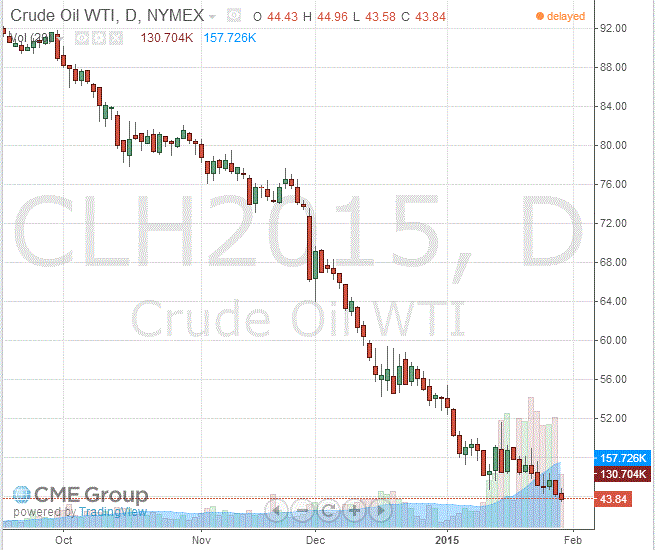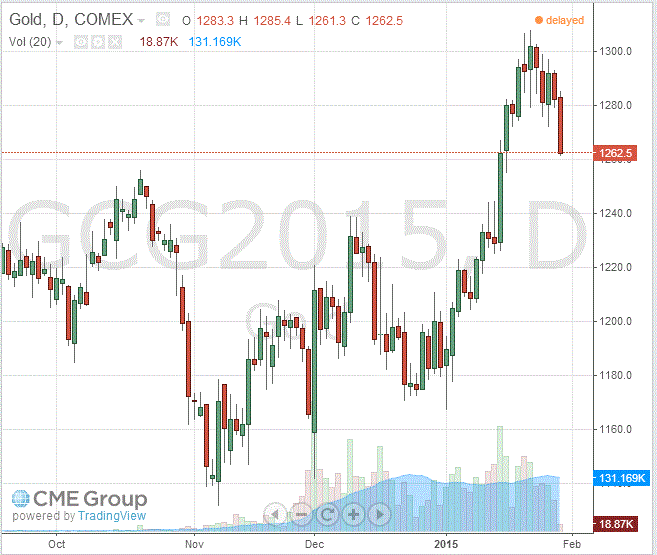Noticias del mercado
-
17:40
Oil: a review of the market situation
The cost of WTI crude oil continued to fall today, while reaching the lowest level in six years, due to an increase in US oil inventories. Meanwhile, the price of Brent crude oil have not changed.
Market participants still analyze yesterday's data from the US Energy Department. Recall commercial oil reserves have increased by 8.9 million barrels - up to 406.7 million barrels. The latter value was the highest for the entire period of statistics with the US Department of Energy in August 1982. Meanwhile, gasoline inventories fell 2.6 million barrels to 238.3 million barrels. Distillate stocks fell by 3.9 million barrels - up to 132.7 million barrels. Utilization rate of refining capacity rose by 2.5 percentage points to 88%. Analysts expected the growth rate by 0.1 percentage points.
The course of trade is also affected by expectations the publication of preliminary data on US economic growth in the fourth quarter. Analysts forecast the US economy expanding by 3.3%
It is worth emphasizing, oil prices fell by almost 60% since June, when the Organization of Petroleum Exporting Countries refused to reductions in production, while production rates in the US were the highest in the past more than 30 years, creating an increased level of supply in the the world oil market.
However, CEO of Royal Dutch Shell Ben van Bearden believes that oil prices should reach a long-run equilibrium at $ 90 per barrel. However, he said that it is currently impossible to accurately predict when prices return to the level of $ 90. In the medium term, in his opinion, the market should expect high volatility.
Earlier, OPEC Secretary General Abdullah al-Badri expressed the opinion that the price of oil reached the bottom and will soon begin to grow. He noted that the price of a barrel could rise to $ 200 in case of reduction of investment in the industry.
March futures price for US light crude oil WTI (Light Sweet Crude Oil) dropped to 43.84 dollars per barrel on the New York Mercantile Exchange.
March futures price for North Sea Brent crude oil mix fell $ 0.04 to $ 48.60 a barrel on the London Stock Exchange ICE Futures Europe.
-
17:20
Gold: a review of the market situation
Gold prices fell today by more than 1 percent, registering the fourth drop in the past five sessions and reached the lowest level since January 16.
The recent wave of recession gold is associated with an article in the WSJ, according to which, the Fed continues to go to higher rates, balancing the hawk and dove hints. Analyst at Wall Street Journal John Hilsenraf said that the Fed observed a balance between those who want to raise the stakes and those who want to leave them unchanged. In a statement, the Fed has no direct comments regarding the growth of the US dollar, but there are words regarding concerns about the movements in international markets. This is an indication that the Fed is closely monitoring the rate of the national currency. The Fed, in its report states that even though the economy is growing "hard", the committee members see that this growth will be moderate in subsequent periods. In addition, the decline in inflation is characterized by the Committee as a temporary phenomenon. The analyst believes that the Fed is going to raise rates in the middle of the year, although markets value the chance to hike in June only 12%. In his article, the analyst argues that "the committee members see a lot of signals that now contradict each other and come from oil prices, inflation, international markets and bond markets. They obviously do not want to jump the gun with the decision. "
Pressure on prices also provided data on the US labor market. As it became known, initial applications for unemployment benefits fell by 43,000 and reached a seasonally adjusted 265,000 in the week ended Jan. 24. This was the lowest level since April 2000. Economists had expected 300,000 new claims. The fall may be due to a shortened work week due to the holiday of Martin Luther King, an analyst said the Ministry of Labour. The data for the previous week were revised up to 308,000 applications compared with the original 307,000.
Optimistic data added optimism about the economic recovery and increased expectations that the Federal Reserve will begin to raise interest rates sooner than previously predicted. Recall expectations rise in interest rates had a negative impact on the dynamics of the price of gold, as the precious metal can not compete with the earning assets with growth rates.
"Investors have already adapted to the new position of the Fed, and they have no reason to seek to raise the price of gold," - said principal analyst at Wing Fung Financial Group in Hong Kong Mark That.
Meanwhile, Phillip Futures experts say that the Fed will raise rates, prices may fall below $ 1,200 an ounce.
The cost of the February gold futures on the COMEX today fell to 1262.50 dollars per ounce.
-
12:20
Oil: Prices recover slightly after declining on U.S. stockpiles at record highs since 1982
Brent crude and West Texas Intermediate are trading higher today after moderately decreasing yesterday which was associated with the release of data on oil reserves in the United States, as well as the strengthening of the US dollar. The US Department of Energy announced that commercial oil stocks rose 8.9 million barrels to 406.7 million barrels, compared to the average forecast of four million barrels. The latter value was the highest for the entire period of statistics with the US Department of Energy in August 1982.
Brent Crude added +0.70%, currently trading at USD48.81 a barrel, still below the important USD50 level. On January 13th Crude hit a low at USD45.19. West Texas Intermediate gained +0.18% currently quoted at USD44.53.
Oil prices fell by nearly 60 percent over the past six months, and both key brands of oil are currently trading below $ 50 a barrel as the worldwide supply exceeds demand in a period of low global economic growth and the OPEC refusing to cut output rates to stabilize prices. Smaller OPEC members want to cut production but the organisation, responsible for 40% of worldwide production focuses on its fight for market share.
-
12:05
Gold prices further decline after FED Interest Rate Decision and FOMC statement
Gold is trading lower today extending loses from the previous sessions after the FOMC statement. Yesterday the Federal Open Market Committee gave a confident outlook on higher inflation and lower unemployment which can be seen as indication that the FED will stick to its plan on hiking interest rates in 2015 for the first time since 2006. The bank will take "international developments" into account when deciding on the exact timing. All members of the FOMC unanimously backed the statement as solid economic growth fuels optimism despite a stronger dollar and declining oil prices.
Higher interest rates make gold less attractive as the metal is not yield-bearing. A stronger greenback also weighed on the dollar-denominated precious metal as it makes it more expensive for holders of other currencies.
The precious metal is currently quoted at USD1,275.80, -0,72% a troy ounce. On Thursday last week gold reached a five-month high at USD1,307.40.
-
10:25
Press Review: Fed Raises Assessment of Economy While Staying Patient on Rates
BLOOMBERG
Fed Raises Assessment of Economy While Staying Patient on Rates
(Bloomberg) -- The Federal Reserve boosted its assessment of the economy and played down low inflation while repeating a pledge to stay "patient" on raising interest rates.
The Federal Open Market Committee described the expansion as "solid," an improvement over the "moderate" performance it saw in December. It substituted "strong" for "solid" in its evaluation of job gains after a meeting Wednesday in Washington.
While inflation "is anticipated to decline further in the near term," the FOMC said in a statement, it is likely to rise gradually toward its 2 percent goal "over the medium term" as the impact of low oil prices diminishes. Policy makers also said cheaper energy will help boost consumer buying power.
The Fed's confidence in the outlook for higher inflation and lower unemployment suggests it will stick to plans to raise interest rates this year for the first time since 2006. One caveat: officials will take "international developments" into account when considering an increase, language that contributed to a decline in stocks and Treasury yields.
REUTERS
ECB' Coeure tells Greece: stick to 'rules of game' - paper
Jan 29 (Reuters) - The Greek government must continue to respect its commitments, a senior policy maker at the European Central Bank told an Italian newspaper on Thursday.
Responding to a question from Corriere della Sera whether Athens must continue to meet its financial obligations, Benoit Coeure, a member of the ECB's Executive Board, said: "Greece must continue to abide by the rules of the game."
Coeure also spelt out the benchmark of success that will determine the duration of government bond buying by the ECB, a programme that was announced last week.
"It will end only once we get a strong sense that inflation is converging towards 2 percent." (Reporting By John O'Donnell Editing by Jeremy Gaunt)
Source: http://www.reuters.com/article/2015/01/29/ecb-policy-greece-idUSL6N0V81KP20150129
BLOOMBERG
Oil Trades Near Six-Year Low Amid Surging U.S. Crude Stockpiles
(Bloomberg) -- Oil traded near the lowest price in almost six years after government data showed U.S. crude stockpiles increased to the highest level since at least August 1982, adding to signs that a global glut will persist.
Futures were little changed in New York after falling 3.9 percent on Wednesday. Crude inventories in the U.S., the world's biggest oil consumer, expanded by 8.87 million barrels to 406.7 million last week, the Energy Information Administration reported. Oil may recover as early as the first half of this year as production is reduced, said Harold Hamm, the chief executive officer of Continental Resources Inc.
-


